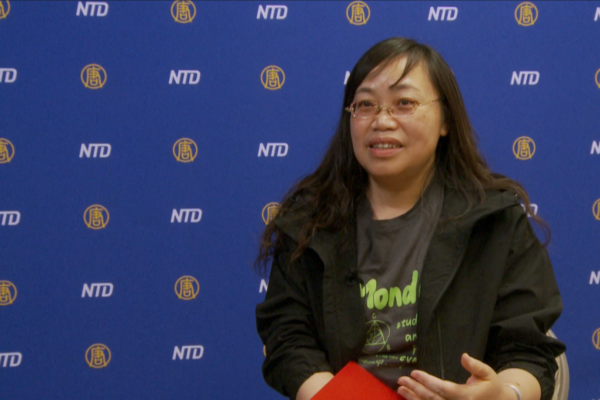In recent years, a significant number of Chinese immigrants who have moved to Los Angeles include not only ordinary citizens but also former high-ranking officials of the Chinese Communist Party and even billionaire business owners. Auctioneer Li Hongyan, who started her own business, had accumulated tens of millions of assets (in Chinese Yuan, RMB) over a decade ago, but unfair treatment by authorities led to almost all of her wealth being confiscated.
Li Hongyan, born in the 1970s, shared with reporters that after graduating from university, she initially worked for a state-owned enterprise. In 1999, two years after obtaining her auctioneer qualification, she became the head of an auction company in Yunnan Province, China. The China Auction Association awarded her with a “Lifetime Achievement Award” in 2018. In 2011, she opened a pawnshop.
During the peak period of the auction industry in China, Li Hongyan had accumulated tens of millions in wealth. The Yunnan Pawnbrokers Association encouraged industry players to “band together” and provide each other with funding. After a vice chairman’s company borrowed 16.2 million from Li Hongyan’s company, the funding chain collapsed at the end of 2013, leading the vice chairman to check into a mental hospital to avoid debts.
Recalling the events, Li Hongyan mentioned that in early 2014, they filed a lawsuit against the vice chairman’s company demanding repayment of the loan, leading to enforcement procedures. By March 2016, after three failed auctions of the seized assets, per civil procedures, the debt should have been settled with assets. Despite multiple applications by Li Hongyan’s company, the responsible judge refused to execute the judgment. Despite her numerous appeals to various departments seeking legal protection, she was met with no success. Subsequently, the executive judge, in his forties, abruptly announced his retirement.
“We couldn’t understand for many years what went wrong. The judge just refused to return the assets to us, and all our efforts were in vain,” Li Hongyan expressed. The 16.2 million funds, mostly personal assets, became an uncollectible bad debt without any clear explanation.
“This is the current situation in China, where a judge can destroy a business,” Li Hongyan lamented. When judges disregard the law, even appealing becomes futile. “Since early 2014 when the litigation began, every step we followed legal procedures, hoping the country would protect our rights. Despite winning the lawsuit, applying for enforcement seemed impossible.”
The second setback began in 2012 with a real estate development project in which Li Hongyan invested. She raised over 17 million and purchased 123 properties near a hot spring. However, the project halted during the final stages of electricity and water installations, and the owner vanished.
Investigations revealed that the owner had engaged in fraudulent activities, selling over 60 of the 123 properties to others without the buyers’ knowledge. As the project remained unfinished, some property owners continued to appeal. A local government and court-appointed law firm acted as the bankruptcy administrator, handling the bankruptcy restructuring process by the end of 2023.
“I vividly remember the bankruptcy administrator’s constant threats, demanding us to do what is ‘politically correct,’ asking us to voluntarily cancel property registrations, warning of illegal operation charges or fake litigation accusations,” Li Hongyan disclosed. The two significant losses placed her in economic crisis, rendering her company unable to hire a lawyer. The fear of being arrested with no resources left led her to surrender the properties for her freedom.
To preserve her personal freedom and seek relief from the prolonged mental torment, she relinquished the pursuit of the assets. Ultimately, she only received compensation for one property. A 12-year investment of over tens of millions only yielded one incomplete property worth several hundred thousand.
The developer’s fraud, unknown to most property owners, was likely well-known by the government department responsible for property registration. The property industry’s largest beneficiaries are the government, as land sales constitute a significant portion of their income. Moreover, by selling more properties than registered, the government gains additional tax revenue. In Chinese real estate projects, purchasing land and paying government fees often represent the most substantial expenses.
Li Hongyan later discovered that the practice of “selling one property to multiple parties” is prevalent in China, with some instances of selling to three or four parties. She expressed that such unfinished projects are directly linked to the government’s regulatory failure at the very least. According to regulations, funds from property purchases by citizens should be stored in dedicated accounts, but developers divert them elsewhere.
Regarding the “politically correct” stance mentioned by the bankruptcy law firm, Li Hongyan clarified, “It means disregarding the law, facts, and surrendering your property without question. In our first case, after completing all civil procedures, the court refused to execute the decision, leaving you with nothing.”
“As an individual, I am insignificant and cannot resist the pressure of the state apparatus,” she said helplessly. The injustices endured over more than a decade have caused significant mental anguish for Li Hongyan, leaving her in constant pain and anxiety.
She had visited the United States twice before, but it wasn’t until she settled in Los Angeles that she truly understood the stark differences between the Communist regime in China and the thriving, peaceful, and inclusive society in America. Despite losing her lifetime earnings, Li Hongyan felt a sense of rebirth in the US, where her daughter attends a prestigious school.
Reflecting on the business environment in China, Li Hongyan cautioned private entrepreneurs to remain vigilant of the authorities. She emphasized that regardless of the business scale, operators should evaluate whether the regime has any boundaries, as they (the Chinese Communist Party) will cross all lines.
未 – untranslated

